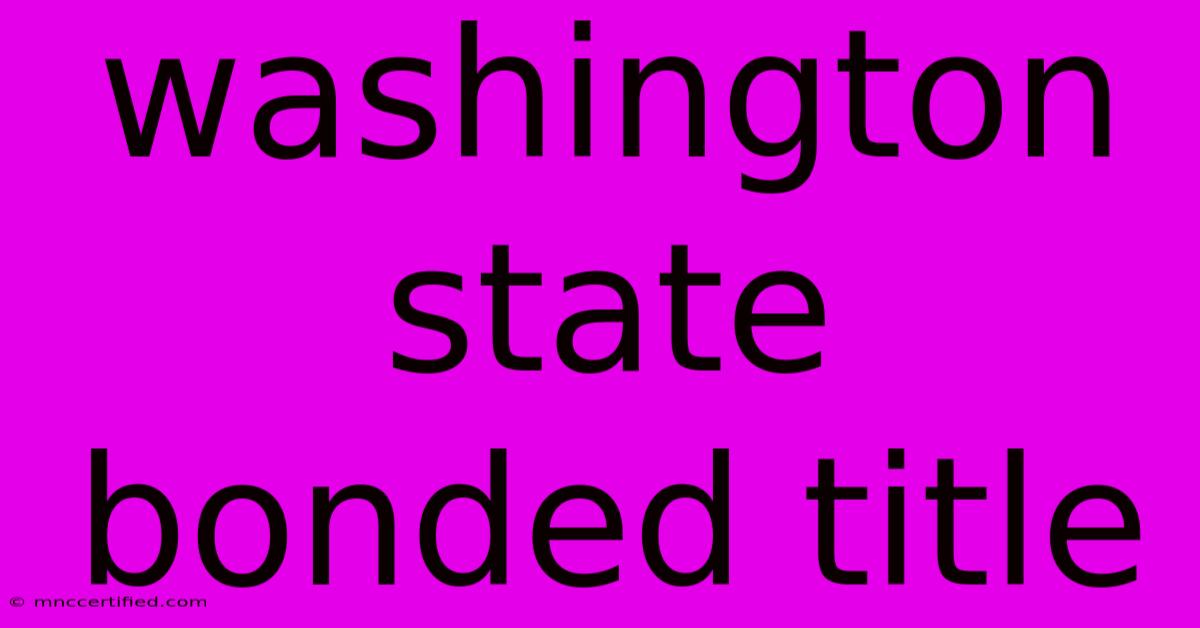Washington State Bonded Title

Table of Contents
Understanding Washington State Bonded Title Vehicles: A Comprehensive Guide
Buying a car in Washington state can be exciting, but navigating the complexities of a bonded title can be tricky. This comprehensive guide will help you understand what a bonded title is, how it differs from a standard title, the process of obtaining one, and the implications for buying and selling such vehicles. We'll cover everything you need to know to make informed decisions about Washington state bonded title vehicles.
What is a Bonded Title in Washington State?
A bonded title in Washington, like in many other states, signifies that the vehicle's ownership history has a gap or a question mark. This often stems from situations like:
- Total Loss: The vehicle was declared a total loss by an insurance company after an accident.
- Stolen and Recovered: The car was stolen and recovered, but its previous ownership history isn't fully documented.
- Unpaid Liens: Outstanding liens or loans on the vehicle remain unpaid.
- Flood Damage: The vehicle sustained significant flood damage.
- Odometer Issues: Discrepancies or a lack of verifiable odometer readings exist.
These situations prevent the issuance of a standard clear title. Instead, the state requires the owner to obtain a bonded title, which involves posting a bond with the Department of Licensing (DOL) to protect against potential future claims related to the vehicle's history. This bond acts as a guarantee to compensate any future rightful owner who might have a claim on the vehicle.
How to Obtain a Bonded Title in Washington State
The process of obtaining a bonded title in WA is relatively straightforward, but it requires careful attention to detail. Generally, you’ll need to:
-
Gather Necessary Documents: This includes proof of ownership (like a bill of sale), proof of identity, and any documentation related to the vehicle's history, such as accident reports or police reports.
-
Apply for a Bonded Title: The application process is completed through the Washington State Department of Licensing (DOL). You can find the necessary forms and instructions on their website. Always consult the official DOL website for the most up-to-date forms and instructions.
-
Submit the Application and Supporting Documents: Ensure all paperwork is complete and accurate before submission. Incomplete applications will be delayed.
-
Pay Applicable Fees: There are fees associated with the application and the bond itself. These fees vary and should be confirmed with the DOL.
-
Obtain the Bond: You’ll need to obtain a surety bond from a licensed surety bond company. This bond protects potential future claimants. The amount of the bond will vary depending on the vehicle's value.
Implications of Buying a Bonded Title Vehicle in Washington
Buying a vehicle with a bonded title carries certain implications:
-
Lower Resale Value: Bonded title vehicles generally sell for less than comparable vehicles with clean titles. Be prepared for a lower resale value when you decide to sell it.
-
Full Disclosure: Always disclose the bonded title status to potential buyers if you resell the vehicle. Failure to do so could have legal ramifications.
-
Potential Legal Issues: Although a bonded title mitigates some risks, there's still a small chance of encountering legal challenges, especially if the vehicle's history is severely unclear.
-
Insurance Implications: Some insurance companies may charge higher premiums for bonded title vehicles due to the increased risk.
Is a Bonded Title Vehicle Right for You?
The decision of whether to buy a vehicle with a bonded title is a personal one. Consider these factors:
- Vehicle Condition: Is the vehicle mechanically sound and in good condition despite its history?
- Price: Is the price significantly lower than comparable vehicles with clean titles?
- Your Risk Tolerance: Are you comfortable with the potential risks associated with a bonded title?
If you are comfortable with the potential risks and the price is right, a bonded title vehicle can be a good option. However, thorough research and due diligence are essential.
Selling a Bonded Title Vehicle in Washington
If you're selling a bonded title vehicle, it's crucial to be completely transparent with potential buyers. Disclose the bonded title status upfront and provide all relevant documentation. This will protect you from future legal issues and build trust with the buyer.
Conclusion: Navigating the World of Bonded Titles in Washington
Understanding Washington state bonded titles requires careful consideration of the legal and financial aspects. By following the steps outlined above and understanding the implications, you can navigate the process successfully, whether buying or selling a vehicle with a bonded title. Always consult the Washington State Department of Licensing (DOL) for the most current information and regulations. Remember, transparency and thorough due diligence are key to a smooth transaction.

Thank you for visiting our website wich cover about Washington State Bonded Title. We hope the information provided has been useful to you. Feel free to contact us if you have any questions or need further assistance. See you next time and dont miss to bookmark.
Featured Posts
-
Bonding A Chipped Front Tooth
Nov 28, 2024
-
Mc Gregor Fiancee Dee Devlins Online Outburst
Nov 28, 2024
-
Serious Crime Groucho Club Closure
Nov 28, 2024
-
Real Estate Investment Phoenix
Nov 28, 2024
-
Mc Gregor Gets Dees Public Support
Nov 28, 2024